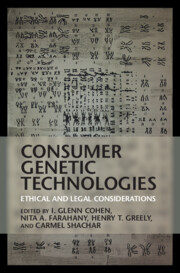
-
Select format
-
- Publisher:
- Cambridge University Press
- Publication date:
- August 2021
- September 2021
- ISBN:
- 9781108874106
- 9781108836616
- 9781108812672
- Dimensions:
- (229 x 152 mm)
- Weight & Pages:
- 0.59kg, 302 Pages
- Dimensions:
- (229 x 152 mm)
- Weight & Pages:
- 0.45kg, 302 Pages
You may already have access via personal or institutional login
Book description
For the average person, genetic testing has two very different faces. The rise of genetic testing is often promoted as the democratization of genetics by enabling individuals to gain insights into their unique makeup. At the same time, many have raised concerns that genetic testing and sequencing reveal intensely personal and private information. As these technologies become increasingly available as consumer products, the ethical, legal, and regulatory challenges presented by genomics are ever looming. Assembling multidisciplinary experts, this volume evaluates the different models used to deliver consumer genetics and considers a number of key questions: How should we mediate privacy and other ethical concerns around genetic databases? Does aggregating data from genetic testing turn people into products by commercializing their data? How might this data reduce or exacerbate existing healthcare disparities? Contributing authors also provide guidance on protecting consumer privacy and safety while promoting innovation.
Awards
Winner, 2022 Choice Outstanding Academic Titles
Reviews
‘This book provides essential reading for anyone interested in what is currently possible or what might soon become possible and how society should think about governing the responsible use of genetic data and biotechnologies … Highly recommended.’
D. Schulman Source: Choice Magazine
Contents
Metrics
Altmetric attention score
Full text views
Full text views help Loading metrics...
Loading metrics...
* Views captured on Cambridge Core between #date#. This data will be updated every 24 hours.
Usage data cannot currently be displayed.
Accessibility standard: Unknown
Why this information is here
This section outlines the accessibility features of this content - including support for screen readers, full keyboard navigation and high-contrast display options. This may not be relevant for you.
Accessibility Information
Accessibility compliance for the PDF of this book is currently unknown and may be updated in the future.


